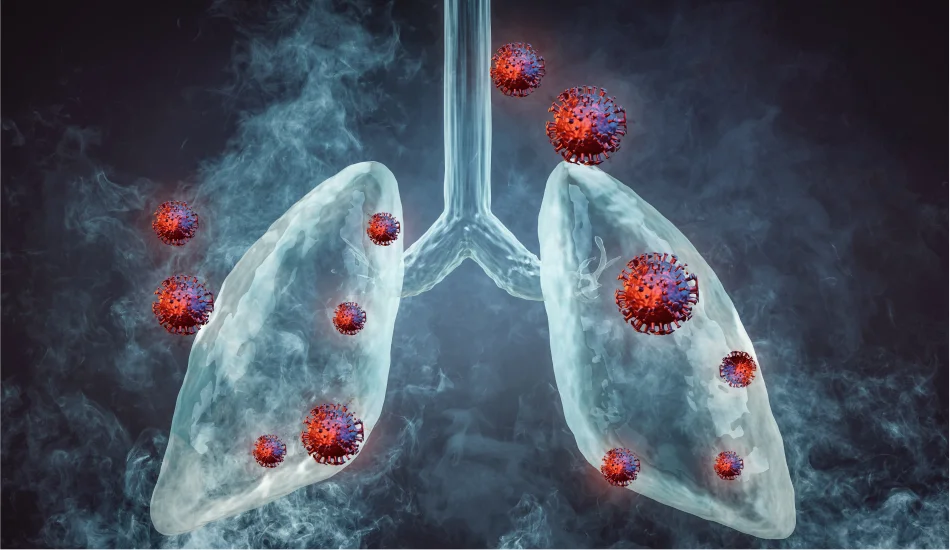
Lung cancer is among the most prevalent and deadly types of cancer in the world. It is a result of the lung tissues usually in cells that line the airways. Understanding the causes, signs of lung cancer, the diagnosis process, and the prevention of lung cancer is essential to detect it early and provide successful treatment. This comprehensive guide will provide useful information about lung cancer. It will help individuals identify symptoms and make proactive efforts to protect their health.
The causes of Lung Cancer
Lung cancer can be caused because of a variety of factors Some of them can be avoided, while some are not our responsibility. The most common reasons for lung cancer are:
- Smoking :- The main source of cancer in the lung is smoking. Tobacco smoke is a source of carcinogens which damage lung cells. The risk increases with quantity of cigarettes consumed and the length of time smoked. Secondhand smoke exposure may increase the risk.
- Radon gas :- Radon is a naturally radioactive gas that occurs naturally and can build up in the homes and structures. Long-term exposure to the high levels of radon raises the risk of developing lung cancer.
- Asbestos :- Asbestos exposure, especially in work contexts, is a well-known risk of lung cancer. Asbestos fibers can be breathed in and cause damage to lung tissue.
- The Air Pollution :- The long-term exposure to polluted air, in particular in urban regions, is associated with an increased likelihood of developing lung cancer.
- Genetic factors :- A family history of lung cancer may raise the risk, which suggests an inheritance predisposition to the cancer.
- Previous Lung diseases :- Chronic lung conditions such as chronic obstructive respiratory disease (COPD) and tuberculosis could increase the likelihood of developing lung cancer.
Signs and symptoms of Lung Cancer
The signs and symptoms of lungs cancer could differ according to the stage and the location of the cancerous tissue. In the beginning lungs cancer, the disease might not show any obvious symptoms. As the disease advances, typical symptoms are:
- Persistent cough :- Cough that doesn’t go away or worsens with time.
- The chest pain :- Chest pain A feeling of discomfort or pain in the chest area, especially when you cough or breathe deeply.
- Breath Shortness :- Difficulty breathing or feeling like you’re out of breath.
- Hoarseness :- changes in the voice, including hoarseness, raspy voice or even a raspy voice.
- weight loss :- Unproved weight loss and an increase in appetite.
- Fatigue :- Tiredness that lasts for a long time and fatigue.
- Coughing up blood :- Hemoptysis, or the coughing up of blood or blood-colored sputum.
- Respiratory Infections :- Common respiratory infections like pneumonia or bronchitis.
Diagnostics of Lung Cancer
The early detection in the case of cancerous lung is vital to ensure a successful treatment. The process of diagnosing lungs cancer typically consists of multiple steps:
- medical history and Physical Exam :- A doctor will go over the patient’s medical history as well as examine the patient’s body to determine if there are any signs for lung cancer.
- Testing for Imaging :- The various imaging tests are utilized to detect lungs cancer. These include:
- Chest Xray :- An essential imaging test that may detect abnormal lumps or nodules within the lungs.
- CT Scan :- The more precise scan that gives lung cross-sectional pictures which help to detect small tumors, and evaluate their dimensions and locations.
- PET Scans :- The test can help determine whether the cancer is spreading to different areas within the human body.
- Sputum Cytology :- A look at Sputum (mucus that is spit out from the lung) using a microscope could often detect the presence of cancerous cells.
- Biopsy :- Biopsy is the process of taking a small amount of lung tissue, which is then examined under the microscope. This can be done by several methods, like bronchoscopy, needle biopsy as well as surgical biopsy.
- blood tests :- The blood tests can be performed to evaluate the overall health of a person and determine possible indicators for lungs cancer.
Prevention of Lung Cancer
The best way to prevent lungs cancer is to take proactive steps to decrease risk factors and enhance healthy lung function. The most effective strategies for prevention include:
- Stop smoking :- The most effective way to reduce the risk of lung cancers is to quit smoking. Find assistance from programs for smoking cessation or medications, as well as counselling to successfully quit smoking.
- Beware of Secondhand smoke :- Reduce your exposure to smoke from second hand sources by staying clear of places where smoking is permitted and promoting a smoke-free space at work and at home.
- Testing for Radon :- Test your home and structures for radon levels particularly in areas that are with high radon levels. If elevated levels are found then take steps to decrease the exposure to radon.
- Reduce exposure to carcinogens :- Be sure to follow the safety guidelines and regulations to limit exposure to carcinogens, like asbestos and other toxic substances at work.
- Maintain an Active Lifestyle :- Maintain an active lifestyle that incorporates healthy eating and regular exercise. It is also about keeping an ideal weight. A diet high in vegetables and fruits can aid in maintaining the health of your lungs.
- Protection Against Air Pollution :- Reduce exposure to pollution from the air by staying indoors during days of high pollution and using air purifiers inside.
- regular health check-ups :- Regular medical examinations and screenings may help to detect lung cancers in its early stage, thereby increasing the likelihood of treatment success.
Conclusion
Lung cancer can be a devastating and potentially fatal condition however the early diagnosis and prevention measures are able to significantly lower the chance of developing it. Knowing the signs, causes, treatment, and prevention from lung cancer vital for patients to take active steps toward maintaining their health. Here at Chirayu Super Speciality Hospital, we’re dedicated to providing complete care and support to patients who are at risk or who have been diagnosed with cancer of the lung.
Our team of experts in oncology as well as pulmonologists and other healthcare experts work together to provide individualized treatment plans and encourage the health of your lung. If you are concerned regarding lung cancers or require assistance in quitting smoking make an appointment with our experts today. Our goal is to ensure your health.



